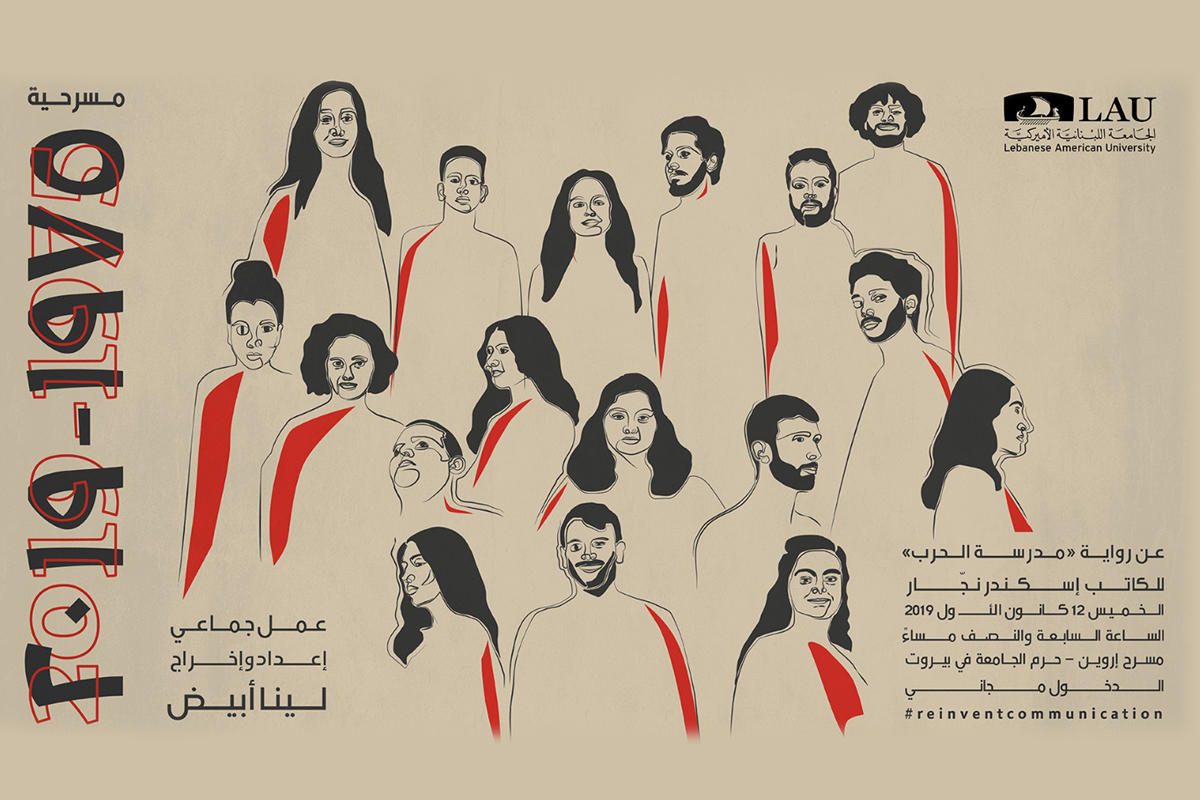Fall Major Theater Production: 1975-2019
Dr. Lina Abyad’s major theater production bids the Lebanese civil war farewell in a compelling rendez-vous.
The women’s march made its way into Martyrs’ Square. I spotted Lina Abyad’s wild red hair among the crowds, her eyes beaming underneath her glasses. I grabbed her by the shoulders and asked, “Lina, what happened to your play?”
The fall major theater production – now titled 1975-2019 – had been scheduled to premiere on October 28, 2019, a week after the mass popular protests broke out across the country. “So, we decided to integrate the revolution into the play,” explains Dr. Abyad, who is an associate professor of theater at the Department of Communication Arts, “hence the new title.”
Originally titled Don’t Be Scared My Dear, It’s Only Fireworks, the production is adapted from a novel by Lebanese lawyer and author Alexandre Najjar, The School of War. The book follows a young man’s return to Beirut right after the end of the civil war, where he finds himself haunted by his memories.
The irony of the play’s timing and topic were not lost on Dr. Abyad, who wanted to show how, 30 years later, the Lebanese civil war continues to haunt the war generation.
Dr. Abyad describes the Lebanese society, especially those who had lived through the war, as two conjoined personas, walking side by side. It is this complex intriguing duality that led her to delve into the ways that the war remains deep-seated in the mind and body of that generation.
“We haven’t been at peace with this. It is still ingrained in our memory, in our body. We are all suffering from post-traumatic disorder. We haven’t really come to terms with what happened,” she said.
The play now – in addition to revisiting the war – addresses what the October 17 revolution means for both the new and the war generations. For Dr. Abyad, the “unity” that was manifested on the ground post-October 17 showed her that in fact the Lebanese have finally turned the page on a painful era in their collective memory.
“Today, after the beginning of the revolution, it became clear that the civil war is a trap in which the Lebanese will not fall into, ever again,” she said.
The characters in the play have invaded the squares, shouting, protesting and engaging in discussions. As they march through the streets, they pass through an art gallery where a piece of art about the Lebanese civil war is being exhibited.
Scenes from the civil war and post-October 17 are juxtaposed, with the characters alternately exploring their parents’ memories of the war and the present.
From the outset, Dr. Abyad decided not to present a re-enaction of the war that would take the audience back to the 70s. “We did not want a realistic reconstruction of this war, nor did we want to present on stage live portraits of the actors and the victims of the war,” she said.
Najjar’s text presented an additional challenge due to the diverse settings in which the novel takes place: Some stories unfold in the privacy of a living room, others at a checkpoint, in the streets of Beirut, the infamous Ring, or in a neighborhood cinema turned into a shelter.
Being a part of the play and specifically one dealing with such a delicate and emotional topic as the civil war had an impact on the cast, most of whom are Communication Arts or Performing Arts students at LAU.
For Performing Arts student Selena Bouri, the process of developing the play in a manner that would be truthful to Najjar’s text was the most challenging. “We realized that the civil war is such an intense topic and has so many different aspects of the way people can lose their humanity, the way someone changes as an individual, and sometimes the way someone gains humanity.”
The idea to stage a play about the trauma caused by the war was originally triggered by an incident in the summer of 2019, when two young men were killed in a Lebanese town.
For Dr. Abyad, the panic that ensued and the speed with which it spread demonstrated how present the fear and the pain still are, albeit “dormant.” Friends started planning to leave Lebanon, others wanted to stock up on food, in what to her was a “completely disproportionate reaction” to what had happened.
However, the October 17 revolution has turned the table on those notions, according to Dr. Abyad.
Could the Lebanese have finally found closure?
The road to peace, Dr. Abyad believes, should be through a holistic national program, and for her, art can play a major role in this healing process, one that has already been triggered by the October 17 revolution.
“The play is meant to be a celebration of the end of the war,” she declares.
1975-2019 will be showing on Thursday, December 12, at 7:30 p.m, Irwin Hall Auditorium, Beirut campus. Admission is free.
